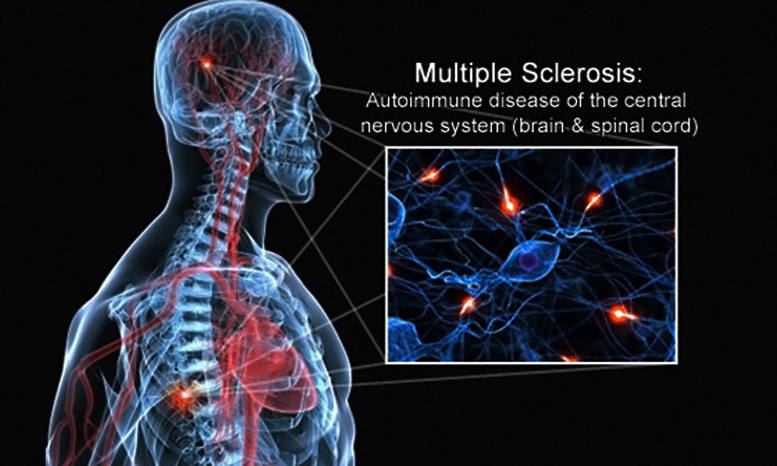Early signs of multiple sclerosis

As one of the world’s most common neurological disorders, multiple sclerosis (MS) is a growing cause for concern. The disease affects the central nervous system, i.e. the brain, spinal cord, and optic nerves in the body, which can lead to a variety of problems. While there is no known cure for the condition, the latest research suggests that an early diagnosis can benefit patients greatly. With that in mind, here are some of the early signs of MS you should look out for.
Fatigue
Feeling more tired than usual? Fatigue is one of the most common signs of multiple sclerosis. Around 80% of people with MS experience this symptom, according to the National MS Society. This change may impact your life negatively by preventing you from being able to work or function normally. If you’re concerned about feeling excessively tired or drowsy, speak to a medical professional.
Tingling and numbness
Changes in tactile sensations could be an early sign of multiple sclerosis. The disease affects your nervous system and sense of touch, which can lead to numbness, tingling, and burning sensations. The National MS Society states that numbness may be the first MS symptom you experience before being diagnosed. Whenever you experience new sensations in your body, it’s worth seeking medical help.
Balance problems
Multiple sclerosis can affect people’s sense of balance and cause them to become dizzy, according to the British MS Society. This change may also affect how you walk, causing you to become unsteady on your feet and even suffer falls. Keep in mind that if you’re experiencing balance problems, you don’t necessarily have MS. However, you may want to speak to a doctor about the issue.
General weakness
Muscular weakness in any part of your body could be an early sign of multiple sclerosis, according to the National MS Society. The condition causes damage to the nerve fibers in the brain and spinal cord, leading to sudden weak feelings. It’s important that you seek medical help if you notice this unusual change. Strength training does not improve the symptom, as it’s related to nerve damage.
Bladder problems
According to the British MS Society, people with multiple sclerosis may have issues with bladder storage or emptying. In some cases of MS, an interruption in the nerve pathways causes your bladder to become overactive. In others, your muscles can’t work in sync, which makes it difficult to empty your bladder. If you’re experiencing either of these problems, make sure to speak to a doctor.
Eye pain
Are you experiencing eye pain or aching when you move your eyes? Optic neuritis, i.e. inflammation of the optic nerve, is a common warning sign of multiple sclerosis, according to the National MS Society. While this feeling is likely to only occur in one of your eyes, you may experience it in both. It’s important to see a doctor when you notice this potential early warning sign of MS.
Loss of vision
Another side effect of optic neuritis is vision loss and blurred vision, according to the National MS Society. When you first begin to experience this symptom, you may notice a blurred spot, known as a ‘scotoma,’ in your line of vision. Whenever you have sight-related problems, it’s important to speak to a medical specialist to determine the cause.
Loss of color vision
For some people with multiple sclerosis, colors that were once vibrant and bright become dull and grey. The National MS Society states that the loss of color vision is due to optic neuritis, a side effect of MS. For example, you may find that colors such as red, blue, and yellow suddenly appear grey. If you experience this type of vision change, you should see a medical specialist as soon as possible.
Difficulty swallowing
‘Dysphagia,’ i.e. trouble swallowing, is one of the common signs of multiple sclerosis. At least one third of people who have been diagnosed with MS experience difficulty swallowing at certain times, according to the British MS Society. Signs of this problem may include food sticking in your throat, trouble when chewing, and food and drink coming back up. As soon as you notice these potential warning signs, speak to a doctor.
Constipation
Constipation is a common bowel problem that occurs in some people who have multiple sclerosis. Symptoms include hard stools, excessive gas, abdominal pain, bloating, and straining when you go to the toilet. While there can be many causes of constipation, you should speak to a doctor if you experience this problem regularly.
Word-finding difficulty
More than 50% of people who have multiple sclerosis will experience problems with their cognitive functions. One of the common symptoms is called ‘verbal influency,’ according to the National MS Society. Put simply, it means you struggle to find the right words when speaking and forget vocabulary you used to know well. If you experience this problem, it’s important to seek medical help.
Memory problems
People who have multiple sclerosis may have trouble making, storing, and retrieving new memories and information. This symptom is also caused by a loss of cognitive function, according to the National MS Society. Issues with your short-term memory may, therefore, be an early warning sign of MS. If you start to exhibit memory problems, keep a diary to monitor their frequency and see a doctor for advice on what to do next.
Difficulty processing information
Another possible symptom of multiple sclerosis is difficulty processing new information and making plans. According to the National MS Society, this issue may signal a loss of cognitive function. Since more than half of all people with MS will develop issues with cognition, this could be a warning sign. If you experience this problem, seeing a doctor may be the right step for you.
Emotional and mood issues
Feeling anxious, low, or stressed out? Emotional and mood-related issues may be early signs of multiple sclerosis, according to the British MS Society. Since MS causes nerve damage in the brain area, the disease can directly affect how you feel on a day-to-day basis. Consequently, your behavior may seem out of character. Don’t ignore sudden changes in your emotional well-being. Speak to a doctor for a proper diagnosis.
Depression
Depression, in various forms, is one of the most common early signs of multiple sclerosis, according to the National MS Society. Studies have also shown that clinical depression is more frequent among people with MS. That said, depression can have countless other root causes. If you’re continually experiencing low moods and depressive thought patterns, it’s important that you speak with a medical professional.
Hearing loss
Around 6% of people who have multiple sclerosis also experience hearing-related problems, according to the National MS Society. In very rare instances, this symptom can be the first reported sign of MS in patients. The cause of this hearing loss may be damage in the nerve pathways within the brain. If you have any type of hearing issue, make sure to have it checked by a medical professional.
Tremors
Experts estimate that 25% to 60% of people with multiple sclerosis experience tremors, which is described as an uncontrollable shaking or trembling. Tremors can be ‘fine,’ meaning small, or ‘gross,’ meaning large. They may affect your daily activities, such as eating and writing. If you notice this physiological symptom, seek medical help.
Spasms and stiffness
At least 20% of people with multiple sclerosis will experience muscle spasms and stiffness, according to the British MS Society. Stiffness means that the muscles are slow to relax, which may make it hard to perform certain movements, such as walking. In some cases, spasms cause the muscles to jerk randomly. If you develop these symptoms, you should speak to a doctor to determine their cause.
Respiratory problems
Muscle weakness is common in multiple sclerosis, and the ventilatory muscles are sometimes affected as well. This means that early signs of MS may include respiratory problems, such as difficulty inhaling and exhaling or shortness of breath while speaking, according to the National MS Society. If you experience either of these issues, seek medical help immediately.
Sexual issues
The central nervous system is responsible for sexual arousal. As such, people who have multiple sclerosis may find that they have trouble becoming aroused. In fact, around 91% of men and 72% of women with MS may experience sexual problems, according to the National MS Society. It’s important to understand that these issues are also common among people who don’t have MS. If you’ve noticed changes in your sexual responsiveness, speak to a doctor to determine the cause.
TIPS FOR PEOPLE LIVING WITH M.S. AND THEIR CAREGIVERS
Eat for optimal health.
The National Multiple Sclerosis Society notes that there’s no special diet for MS, but that eating a diet low in fat and high in vitamins and fiber can help you feel better, while maximizing your energy and supporting healthy bladder and bowel function.
A good diet supports caregivers too, with more energy, optimism and general health.
A better diet may actually be therapeutic for MS patients, since it can help them avoid metabolic syndrome, the all-too-common constellation of high blood pressure, high blood sugar, high cholesterol, abdominal obesity and insulin resistance that puts patients at risk for developing diabetes, cardiovascular disease and other chronic conditions.
Commit to regular exercise.
Research shows that people with MS who participate in an aerobic exercise program benefit from improved cardiovascular fitness, increased strength, better bladder and bowel function, and a more upbeat attitude.
Yoga, adaptive tai chi and water exercise are also excellent workouts for people with MS and anyone else, including busy caregivers who can benefit from stress management.
Address sleep issues.
MS can cause sleep problems, including insomnia, frequent nighttime urination, narcolepsy and leg spasms — over half of MS patients suffer with restless legs syndrome.
Sleep is very much underestimated in brain function. We know there’s a correlation between poor sleep and both Alzheimer’s and MS.
It’s hard to tell which comes first, since people with MS have disrupted sleep patterns. There can be early morning awakening caused by depression and nighttime awakenings due to overactive bladder. But we do know that poor sleep correlates with poor daytime cognitive ability, which can affect patients’ ability to cope.
Be proactive and ask your doctor for help, whether you’re suffering with MS or caring for someone who has it. Chronic illness can be exhausting, and MS patients and their caregivers both need as much quality sleep as they can get.
Customize your environment.
MS symptoms can strike suddenly and make it hard for patients to physically navigate their environment.
Life is easier for people with MS when their homes and offices are arranged for maximum efficiency and minimum risk. Keep essentials within easy reach, install safety features in the bath and shower and cut down on clutter to reduce the risk of falls.
Reach out and get involved.
Self-help and MS support groups can help you connect with other patients and caregivers and establish a valuable network for exchanging ideas, new research news and encouragement. Check your local hospitals or care centers, as well as MS organizations
There are also many devices out there that can greatly improve your quality of life, improve balance or help with Foot Drop, plus assist with limb weakness.
Here are just a few:
SAEBOSTEP FOR FOOT DROP:

Lightweight, Discreet, Affordable, and readily available at
NEW and IMPROVED SaeboStep. – JGH Rehab
SAEBOGLOVE TO ASSIST WITH GRASP AND RELEASE

Lightweight, easily donned, Affordable and readily available at
EMS or Electrical Muscle Stimulation to help reduce Spasticity and maintain Range Of Motion


Easy to Operate, Affordable, and readily available at
Phase-5 TENS + EMS Combo – JGH Rehab Canadian Residents
or for US / UK Residents
SaeboStim Pro Electrical Stimulation Device for Stroke Recovery | Saebo
Should you have any questions or need advice on our other products that may help you, please contact:
Canada: JGH Rehab 1-416-420-4052
USA: Saebo 1-888-284-5433
UK: Saebo 01707 323 633




















